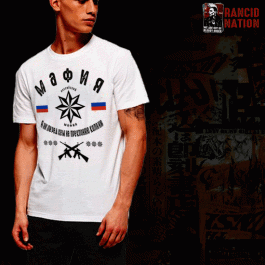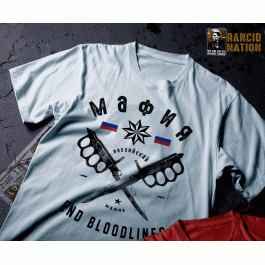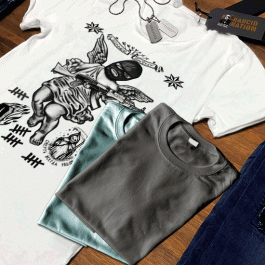Russian Prison Tattoo: "I Shall Not Forgive Betrayal"
The phrase "I Shall Not Forgive Betrayal", as displayed on a T-shirt, resonates deeply within the ethos of Russian prison culture. It symbolizes loyalty, vengeance, and an unyielding adherence to the unwritten code of the criminal underworld. This expression acts as a warning to those who might break the sacred trust between comrades, a promise of retribution that speaks to the harsh realities of the Russian penal system.
This tattoo is not just a declaration but a reflection of the wearer’s life philosophy—one rooted in defiance and survival. Rancid Nation brings this powerful statement to the world of streetwear, making it accessible to anyone drawn to the unrelenting spirit of Russian criminal culture.
Woman Crying with Her Hands on Her Face and Handcuffed Tattoo
This haunting tattoo features a crying woman covering her face with cuffed hands, symbolizing despair, loss, and guilt. In Russian prison tattoos, this design often represents:
- Betrayal or Regret: The image conveys the pain of being betrayed or the weight of one’s own actions that led to imprisonment.
- Lost Love: It might signify a relationship destroyed by crime or incarceration, symbolizing longing and heartbreak.
- Commitment to the Criminal Path: The cuffs highlight the inevitability of a life bound to the criminal code, with no way out.
This tattoo speaks to the emotional and psychological toll of life within the Russian prison system, embodying sorrow and resilience in equal measure.
The History of the Russian Mafia
Origins and Rise to Power
The Russian Mafia, or Bratva, traces its roots to the 18th and 19th centuries, growing out of the social chaos of imperial Russia. By the early 20th century, vory v zakone ("thieves-in-law") emerged, creating a strict criminal hierarchy and code that dictated the behavior of its members.
The Soviet Union’s gulag system during Stalin’s regime was a breeding ground for organized crime. Hardened criminals in these brutal labor camps formed alliances, honed their skills, and codified their symbols through tattoos.
Post-Soviet economic collapse in the 1990s allowed the Russian Mafia to flourish globally. They infiltrated industries, from arms trafficking to cybercrime, establishing themselves as one of the world’s most formidable criminal networks.
Notable Figures
- Semion Mogilevich: Known as “The Brainy Don,” he orchestrated global financial schemes.
- Vyacheslav Ivankov ("Yaponchik"): Instrumental in bringing Russian Mafia operations to the U.S.
- Grandpa Hassan (Aslan Usoyan): A patriarch of the post-Soviet underworld.
Hand and Finger Tattoos Worn by Russian Mafia Bosses
- Stars on the Shoulders or Knees: Indicate rank and authority; stars on knees signify "I bow to no one."
- Spiderwebs on Hands: Represent entrapment in crime, often earned through serving long sentences.
- Crosses on Fingers: Show devotion to the criminal code or rank within the vory v zakone.
- Skull Rings: Denote enforcers or individuals who have killed in the name of the Mafia.
These tattoos serve as both identifiers and reminders of the wearer’s place within the criminal hierarchy.
Popular Russian Mafia Tattoos and Their Meanings
- Church Domes: Each dome symbolizes a prison sentence; more domes indicate more time served.
- Barbed Wire: Represents life imprisonment or commitment to the criminal path.
- Skulls: Associated with hitmen or killers.
- Crying Eyes: A symbol of grief, often mourning a lost loved one or a life lost to crime.
Russian Criminal Tattoos in Streetwear and Media
The enigmatic and bold nature of Russian criminal tattoos has captivated audiences through gangster films like Eastern Promises and documentaries that delve into the gulag system. In streetwear fashion, these tattoos have become synonymous with rebellion and resilience, offering a raw, unfiltered aesthetic.
The notoriety of prisons like the Black Dolphin and their association with extreme survival further amplifies the allure of these tattoos. Streetwear brands like Rancid Nation celebrate this culture by bringing these powerful symbols to a wider audience, merging historical art with contemporary fashion.
Why Are Tattoos Popular?
Tattoos are a universal medium of self-expression, allowing individuals to tell their stories and mark their identities. In Russian prison culture, tattoos hold even deeper significance, serving as visual résumés, badges of honor, and markers of identity. Their popularity in mainstream fashion stems from their rich symbolism, authenticity, and the fascination they evoke.
Rancid Nation: Your Ultimate Source for Russian Criminal Tattoo Apparel
Why Choose Rancid Nation?
- Authenticity: Every design is rooted in the rich history of Russian criminal tattoos, offering genuine symbolism and meaning.
- Quality: Our T-shirts are crafted from premium materials for durability and comfort.
- Unparalleled Design: Iconic pieces like I Shall Not Forgive Betrayal and Woman Crying with Handcuffs bring history and art to life.
Perfect for Enthusiasts and Trendsetters
Whether you're a fan of streetwear, gangster movies, or the raw aesthetic of Russian prison tattoos, Rancid Nation has something for everyone. Make a bold statement with our exclusive designs!
Are you ready to wear history? Dive into the world of Russian criminal tattoos with Rancid Nation, the leading brand for bold, authentic, and meaningful apparel. Each T-shirt tells a story—of defiance, resilience, and survival.
Stand Out with designs like I Shall Not Forgive Betrayal and Woman Crying with Handcuffs.
Be Inspired by the raw aesthetics featured in gangster movies and documentaries.
Own a Piece of Culture with authentic, intricately designed apparel rooted in history.
Shop Now at Rancid Nation and transform your wardrobe into a canvas of rebellion and artistry. Don’t just wear a shirt—wear a story.
Visit Rancid Nation today and embrace the legacy!
 Pay in 4 interest-free payments on qualifying purchases.
Pay in 4 interest-free payments on qualifying purchases.

















